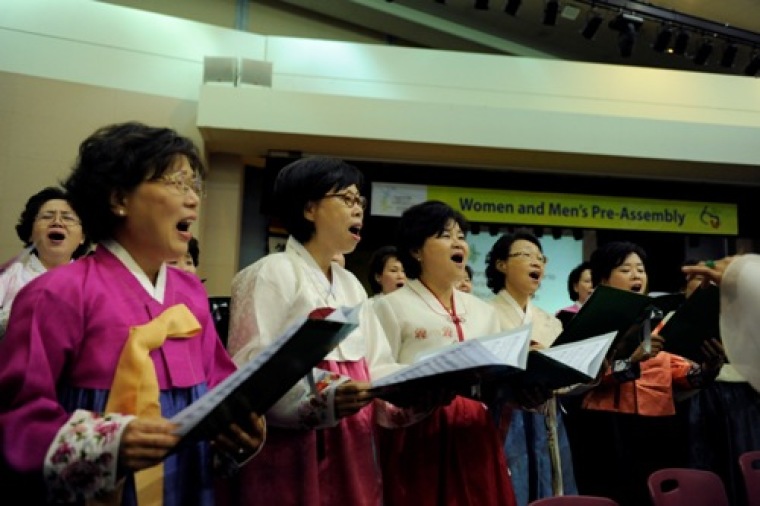
The current year marks 60 years since the establishment of the WCC programme on Women in Church and Society. This programme provides an opportunity for women representing different Christian traditions, regions and age groups an opportunity to share their visions so they may contribute to society, ecumenical movement and the search for Christian unity.
For the first time in Busan, the pre-assembly gathering of women also included participation of men to reflect on the contribution and role of men towards building a just community of women and men in the church and society. The event provided a platform for shared dialogue between women and men on issues of gender justice.
The Women and Men's Pre-assembly event began with 60th anniversary celebrations. The men joined celebrations of the work of women including Bishop Barbel von Wartenberg Potter from Germany, who served as director of WCC's Programme for Women in Church and Society from 1983 to 1986; and Dr Aruna Gnanadason from the Church of South India, programme executive for Women in Church and Society, 1991 to 2011. Gnanadason was present at the celebrations and participated in the two-day conversations.
The celebrations continued with a vibrant welcome from Korean and other Asian assembly participants. This also provided an opportunity for an introduction to the Korean culture along with the global company of women and men gathered from across the world.
The women in pre-assembly reflected on the assembly theme "God of life, lead us to justice and peace". They acknowledged the realities of many communities that are life-denying to women including the stories of sexual violence, abuse and rape of women as a weapon of war in the Congo and the demolition of homes and its corresponding trauma for women and children in Palestine.
Reflecting on women's journeys
The women at the event also shared experiences of injustice in church and society, which included denial of ordination for women in church ministry and human trafficking. Many women wept at the stories of human trafficking and abuse of women and girls. It is reported that human trafficking for the purpose of sexual slavery and forced labour represents estimated 32 billion US dollars per year in an industry that enslaves more than 30 million women, men and children each year.
A key session during the women's conversations included a presentation by the Rev. Dr Elaine Neuenfeldt of the Luther World Federation on "Identifying and dismantling patriarchy and other systems of oppression for women". She pointed out that in order to transform systems of oppression and achieve gender justice there is a need for clear processes, strategies and policies that promote and encourage the equal participation of women and not simply events for gender justice.
A resounding theme of the conversations among the women has been the call for the recognition that "all women's issues are community issues and community issues are women's issues". Rev Dr. Jennifer Leath of the Africa Methodist Episcopal Church and Yale Divinity School invited consideration for a broader dialogue on issues of gender that will create opportunities for women to dialogue with the other assembly participants such as youth, indigenous peoples and persons with disabilities.
Male participants in their pre-assembly space gathered for an open conversation on masculinities, justice and its connection to gender justice. Victor Kaonga of Trans World Radio in Malawi summarized men's conversations as an in-depth reflection about the role men play in the advocacy for gender justice. He indicated that the men celebrated achievements of women in their gender justice journey that encouraged men to acknowledge the social structures and privileges of patriarchy to maintain the status quo for women especially in the church. The men also had an opportunity to share their real life experiences and journeys as men and the development of positive masculinity.
The Women and Men's Pre-assembly provided an inclusive space for dialogue and sharing of conversations between women and men as they journey together in the building of a just community of women and men.
The commitment to gender justice will continue during the WCC assembly, where participants will be encouraged to wear black and support "Thursday in Black" campaign. Through this simple gesture, participants are invited to be part of a global movement urging an end to violence against women. "Thursdays in Black", according to Dr Fulata Mbano-Moyo, WCC programme executive for Women in Church and Society, is a "united global expression of the desire for safe communities where we can all walk safely without fear of being raped, shot at, beaten up, verbally abused and discriminated against due to one's gender or sexual orientation."